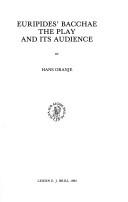| Listing 1 - 1 of 1 |
Sort by
|

ISBN: 9004070117 900432805X 9789004070110 Year: 1984 Volume: 78 Publisher: Leiden
Abstract | Keywords | Export | Availability | Bookmark
 Loading...
Loading...Choose an application
- Reference Manager
- EndNote
- RefWorks (Direct export to RefWorks)
The purpose of this book is to investigate what it was Euripides intended to convey to the theatre-going public of his day when he wrote his most exciting and most gruesome play, the Bacchae . The meanings which are to be attached to the action of a play are woven by an audience, both during and after the performance, into a single dramatic experience, labelled in this book as 'audience response'. After some introductory chapters dealing with the history of the interpretation of the Bacchae and with the theory of audience response, the main part of the book is devoted to a detailed analysis of the action of the play (chapters 4 and 5), and to a study of Dionysus in his various apects in Athenian life and in his appearances in earlier literature and on the tragic stage. The discussion of the choruses concentrates on the choruses' repeated utterances about cleverness and wisdom, which form the core of the Dionysian propaganda of the play. The most immediate results of this new interpretation of the Bacchae are that the widely-accepted view of Pentheus as a dark puritan, a man possessed by the Dionysian qualities of his divine opponent, proves to be untenable, and that that which in the past has been rightly called the overriding theme of the play - the god's epiphany - also contains the poet's most serious and ironical discussion of divinity and of man's treatment of it. The problems of the Greek text are given full discussion, mainly in the nots and appendices. In many cases new solutions are proposed; some new problems are however added.
Euripides --- Dionysos (Divinité grecque) dans la littérature --- Dionysus (Greek deity) in literature --- Dionysus (Griekse godheid) in de literatuur --- Greek drama (Tragedy) --- Bacchantes in literature --- Theater audiences --- Pentheus (Greek mythology) in literature --- Tragédie grecque --- Bacchantes dans la littérature --- Théâtre --- Penthée (Mythologie grecque) dans la littérature --- History and criticism --- History --- Histoire et critique --- Publics --- Histoire --- Euripides. --- Theater --- Pentheus, --- In literature --- -Theater audiences --- -Audiences, Theater --- Theatergoers --- Performing arts --- Theater attendance --- Dramatics --- Histrionics --- Professional theater --- Stage --- Theatre --- Acting --- Actors --- -Audiences --- Audiences --- -History --- -Euripides --- Euripide --- Tragédie grecque --- Bacchantes dans la littérature --- Dionysos (Divinité grecque) dans la littérature --- Théâtre --- Penthée (Mythologie grecque) dans la littérature --- Audiences, Theater --- Dionysus --- In literature. --- Bacchantes in literature. --- Literature. --- Theater. --- Theater audiences. --- Belles-lettres --- Western literature (Western countries) --- World literature --- Authors --- Authorship --- Penthée, --- Tentheus, --- Bacchus --- Bakchos --- Dionís --- Dionisas --- Dioniso --- Dionīss --- Dionisu --- Dioniz --- Dionizi --- Dionizo --- Dionizos --- Dionüszosz --- Dionysos --- Dionýzos --- Diyonizosse --- Πενθεύς, --- Τενθεύς, --- Διόνυσος --- Дионис --- ديونيسوس --- 디오니소스 --- דיוניסוס --- ディオニューソス --- 狄俄倪索斯 --- Βάκχος --- Діоніс --- Bacchae (Euripides) --- Bacchantes (Euripides) --- To 1500 --- Greece. --- al-Yūnān --- Ancient Greece --- Ellada --- Ellas --- Ellēnikē Dēmokratia --- Elliniki Dimokratia --- Grčija --- Grèce --- Grecia --- Gret͡sii͡ --- Griechenland --- Hellada --- Hellas --- Hellenic Republic --- Hellēnikē Dēmokratia --- Kingdom of Greece --- République hellénique --- Royaume de Grèce --- Vasileion tēs Hellados --- Xila --- Yaṿan --- Yūnān --- Philology --- Theater - History - To 500 --- Euripides - Bacchae --- Pentheus, - King of Thebes (Mythological character) - In literature --- Pentheus, - King of Thebes (Mythological character)
| Listing 1 - 1 of 1 |
Sort by
|

 Search
Search Feedback
Feedback About UniCat
About UniCat  Help
Help News
News